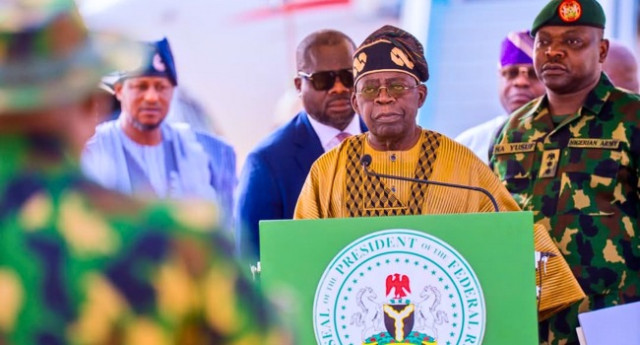The Senate and House of Representatives have once again prolonged the implementation of the capital component of the 2024 budget, now extending it to December 31, 2025.
This has reignited criticism towards President Bola Tinubu and the National Assembly.
Economists, financial experts, and the Organized Private Sector view these repeated extensions as indicators of poor execution capabilities by various Ministries, Departments, and Agencies.
Critics suggest that this may erode fiscal discipline and complicate the assessment of budget performance. The Red Chamber made this decision during a plenary session on Tuesday, following an amendment to the appropriation bill that requested the extension.
Deputy Senate President Barau Jibrin presided over the session, where the appropriation bill underwent quick readings for approval.
Chairman of the Senate Committee on Appropriation, Olamilekan Adeola, led the discussions, stating that the extension is necessary for the Federal Government to finish ongoing projects listed in the budgets.
He pointed out that the government lacks sufficient resources to meet the proposed expenditures in the budget. Therefore, he encouraged support for the extension to prevent abandonment of projects nationwide.
Additionally, the House of Representatives conducted a second reading of a bill aimed at extending the implementation of the 2024 budget's capital component.
The bill, presented by Deputy Majority Leader Ibrahim Halims, is titled “A Bill for an Act to Amend the 2024 Appropriation Act to Further Extend the Capital Components of the Act From June 30, 2025, to December 31, 2025, and for Related Matters.”
During the session, Speaker Tajudeen Abbas emphasized the necessity of the budget extension due to insufficient implementation of the capital component. The bill was passed for a second reading via a voice vote and referred to the Committee on Supply for further legislative action. Initially, the capital component deadline was moved from December 31, 2024, to June 30, 2025, at the request of President Bola Tinubu to allow completion of ongoing projects.
This extension was granted after extensive debate in both congressional chambers. However, as the June 30, 2025, deadline neared, it became clear that numerous critical projects funded by the 2024 budget remained unfinished, prompting this new extension.
With the new deadline of December 31, 2025, Nigeria now has two budgets operating within a single fiscal year: the 2024 budget still being executed and the 2025 budget which has already passed and is currently effective.
A source from a federal ministry revealed that the 2025 national budget's implementation has yet to start, almost seven months into the fiscal year.
Speaking anonymously out of fear of repercussions, a senior official stated that all expenditures and operations at the ministry are still covered under the 2024 budget, resulting in significant delays in payments to contractors and government staff.
The official remarked, “The implementation of the 2025 budget is still in process and should likely start by August.”
They added that the delay is affecting the ministry's operations, as outstanding travel allowances and other employee payments remain unpaid.
"From January until now, all our expenses have come from the 2024 budget, impacting our work since contractors and staff haven’t been paid.
All travel allowances for this year haven’t been settled, and people are incurring debts. We hope the same extension will be granted for the 2025 budget as was for the 2024 budget.”
The Director of Press and Public Relations at the Accountant General's Office, Mr. Bawa Mokwa, stated that capital funds from the 2024 budget were disbursed to several ministries last week.
He noted that the understanding was that the implementation of the 2025 budget would only begin once the 2024 capital component was officially closed, although he did not provide further comment on the recent extension.
Economist Ayo Teriba, Chief Executive Officer of Economic Associates, expressed concern that the budget extension is becoming routine, with a lack of resources to fund the projects.
He remarked, “It’s turning into a habit. The first extension may have been a mistake, but a second occurrence establishes a pattern. They did the same with the inherited 2023 budget, extending the capital portion, and again for 2024, we find ourselves in a similar situation.
By December 2025, we may simply stop addressing it.” He added that if funds are lacking, they should seek funding sources to adequately finance capital votes within a year.
Teriba raised questions regarding whether the first quarter of the budget was funded, asking, “I heard the minister of finance mention a revenue of N6.9 trillion in the first quarter.
How much was allocated for capital expenditure during that period? We require clarity on the first quarter's funding.” Paul Alaje, Chief Economist and Partner at SPM Professionals, argued that extending the capital component of the 2024 budget until December would impact the money supply.
He explained, “This means the money supply will grow since projects from the 2024 budget that should have concluded will be ongoing alongside those of the 2025 budget. While this may have some positive aspects, it could also lead to inflation spikes.”
Alaje stressed Nigeria must recognize that a budget is cyclical and that if extensions are necessary, the first quarter of the new year should be when they occur to allow effective implementation of the current budget, creating predictability and establishing inflation expectations.
Professor Akpan Ekpo highlighted the significance of the capital budget components in stimulating economic growth, asserting, "The forecasts for the capital budget needed better modeling. Managing two budgets creates embarrassment and could stem from delays and revenue uncertainties, impacting economic growth, employment, and development.”
The former Vice Chancellor of the University of Uyo emphasized that this could exacerbate the current stagflation phase of the economy.
CEO of the Centre For The Promotion Of Private Enterprise, Muda Yusuf, noted that historically, capital budget execution has been suboptimal and suggested that various factors, including collapsing revenue assumptions, such as the underperformance of oil revenues in 2024, could be contributing to the ongoing challenges.




















